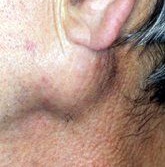Head and Neck surgery
Head and Neck surgery as the name implies includes surgeries right from base of the skull to the root of the neck excluding eye, brain and spine surgeries. Head and Neck is particularly challenging area of the body because-
- Most areas are small and the surgeon requires a detailed knowledge of anatomy to perform accurate surgeries.
- This area contains a lot of important structures like the blood vessels, nerves controlling the rest of the body, passage for air and passage for food.
- It is difficult to diagnose diseases in this region because they are hidden and the surgeon requires a high degree of clinical suspicion to identify them
- Access/approach to some areas in this region is very difficult because of the vital structures surrounding the disease and or the deep seated nature of the disease.
- Disorders such as infections or tumours in this region can be life threatening as they can compress the windpipe. The emergency treatment needed for these patients is extremely challenging for any trained surgeon
Commonly performed surgeries at our centre include -
Thyroid surgery
Enlargement of thyroid gland called goiter causing compression of foodpipe or windpipe needs surgical attention. Similarly a suspicious looking thyroid nodule on sonography also needs surgical intervention.
Early stage thyroid cancer is known to have good prognosis with surgery

Swelling of the thyroid gland (goiter)
Parathyroid surgery
Benign parathyroid tumor called adenoma is one of the most common conditions causing hypercalcemia. Removal of this is called parathyroidectomy that leads to normal calcium levels.

Swelling of the left parotid gland
-
Salivary gland surgery
Salivary glands are situated around the oral cavity and are often a site of infection, stones or tumours there are two major salivary. Acute infections of these can be treated with medication. However glands called provid and submandibular glands. Enlarged glands due to repeated infections or tumours may surgical removal. They are called parotidectomy involving parotid glands and excision of submandibular gland for involvement of submandibular gland that is located in the neck.
Head and Neck Oncosurgery –
This is surgery performed for cancers of the head and neck region. Oral cancers involving the tongue and cheek are a big problem in our country because of widespread addiction to tobacco products. This includes chewing tobacco in supari, gutkha, smoking cigarettes, bidis etc. Most of these cancers start with a small lesion which often doesn’t cause any symptoms and is ignored by the patient. Hence patients present in late stage of the disease when they become ulcerated and bleed. Biopsy of the suspicious lesion in which a small piece of the tissue is removed and examined by a pathologist, confirms the diagnosis. Early diagnosis and treatment yield good results in these tumors
Apart from oral cancers, cancers of the throat such as cancers of voice box, cancers of the thyroid gland, salivary gland, cancers involving the nasal cavity are also common in India. Treatment of head and neck cancers requires a multi-disciplinary approach that consists of oncosurgeon, medical oncologist (doctor who prescribe chemotherapy), radiation oncologist (doctor then treats with radiation), dentist, radiologist (doctor that looks at x-ray films), doctor in nuclear medicines(that looks at PET scan), speech and language pathologist (that helps with speech and swallowing) and clinical coordinator to help patients coordinate with all the above services.
